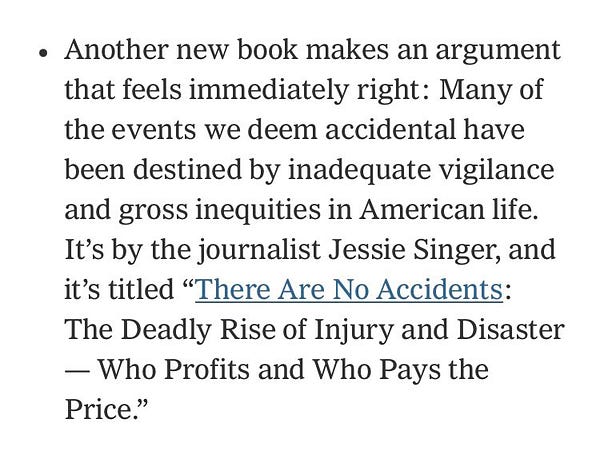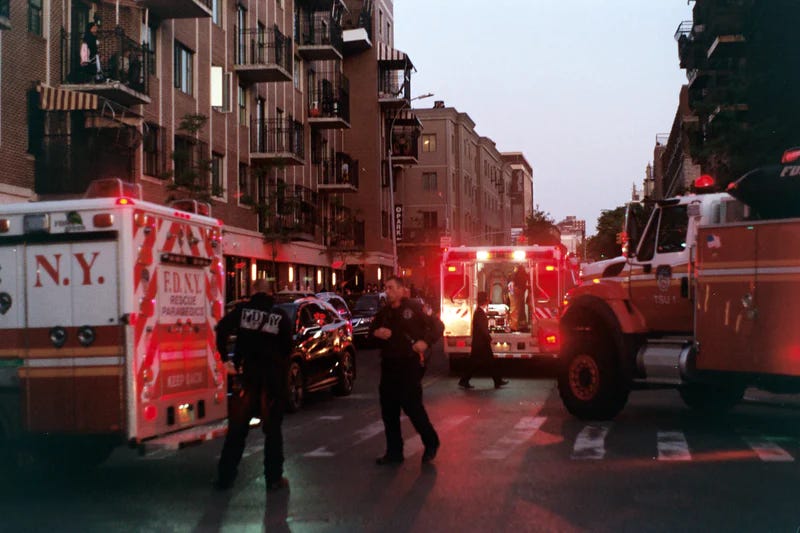Why the Poor Stay Poor in America - Accidental Injury and Death:
Welcome to Crime and Punishment: Why the Poor Stay Poor in America. I’m thrilled that you signed up to read my newsletter, and I hope that together, we can make a difference.
“More people die by accident today than at any time in American history. The accidental death toll in the United States is now over 173,000 people a year……An accident injures ninety-two people every minute of the year and kills twenty every hour.” From the book: “There Are No Accidents. The Deadly Rise of Injury and Disaster—Who Profits and Who Pays the Price, by journalist, Jessie Singer The United States is one of the top ten richest countries on Earth (by per capita GDP) and certainly has one of the largest economies by all measures.¹ So why does it have the highest accidental death rate among dozens of other wealthy nations? Perhaps it is because our country does not invest its money in our people and the services that care for them, especially for our most vulnerable populations. Elected officials have consistently tried to cut social safety net programs since their inception, and these cuts, plus elimination of programs altogether, are today’s rallying cry for a good 50% plus of those we elect to govern. The countries who have much stronger social programs, including government run medical coverage, have less poverty and much less accidental injury and death rates than the United States.² According to journalist Jessie Singer’s book, published in February, There Are No Accidents. The Deadly Rise of Injury and Disaster—who Profits and Who Pays the Price, not only does the United States have the most “accidental” injury and death compared to other rich countries, these injuries and death can be traced along economic and racial lines: the poor and minorities suffer more accidental injury and death than the wealthier and white population. This recent interview with Singer in The New York Times discusses her reasons for writing the book, which tragically, were prompted by the death of her best friend, who was struck and killed by a drunk driver while riding his bike. She traces the history of accidental deaths in our country, which were drastically reduced after World War II with the expansion of the social safety net, more comprehensive regulation, especially in the workplace, and the rise of unions. After 1992, accidental deaths started to rise—Singer blames it on the advent of de-regulation in the Reagan era which coincided with the decline of unions. Unfortunately, accidental injury and death are continuing to rise, and today, it seems to have a fascinating intersection with the last five years or more of deregulation and the defunding of regulatory agencies, allowing them to do only a fraction of their work. According to statistics presented in an article by the Brookings Institution, there was both a slashing of existing government regulation and a decrease in new rule making during the Trump administration by comparison to his predecessors. An analysis published in Government Executive explains why government regulation exists at all:
“Free market rights” is an interesting concept. When I practiced environmental law, I heard a form of that argument from the regulated community endless times: “If our company has to comply with these regulations, we’ll go out of business,” they cried (and I mean literally cried). The problem was that “these regulations” prevented the companies from dumping raw sewage or toxic, cancer-causing chemicals into the water, land and air. I worked for nearly 15 years as an attorney for the Ohio EPA and still never saw a point where companies just automatically factored in the cost of compliance into the cost of doing business— instead they fought regulation at every opportunity. But these same regulations, and probably more so those implemented by the Occupational Safety and Health Administration (OSHA), protect all of our country’s residents from accidental injury and death. In the introduction to Singer’s book, she explains why the word “accident” is no longer used professionally to describe how an injury or death is caused — “the word accident erroneously implies that the injuries occur by chance and cannot be foreseen or prevented.” And she rightfully expresses outrage at the lack of accountability the driver who killed her friend expressed, simply by using the word “accident”, at his sentencing: “Words cannot express how truly sorry I am,” he told the court, for this accident that happened.” As Singer stated, this was “the disembodied telling, as if the killer had nothing to do with the killing.” When government regulation is stripped and government has little to no positive presence in our lives, there tends to be a lack of accountability among its citizens. This could mean anything from driving intoxicated, to refusal to take a vaccine or wear a simple piece of cloth to protect fellow citizens against a deadly, contagious disease. Are we a nation of “rights”, or are we a nation of responsibilities— to each other and the common good? Thomas L. Friedman, Pulitzer Prize winning journalist and author, and opinion columnist for The New York Times elaborates on this idea in a piece published last month, focusing on the Spotify/Joe Rogan/Neil Young controversy. Friedman states:
I also believe that our trust in government and each other has eroded over the decades (sometimes for good reason), and this trust has to return if we want to unify our country and lift our citizenry to a higher plane of living. To encourage and help all of our people to thrive rather than exist. Please share your thoughts in the Comment Section below. And if you are not already a free or paid subscriber, I encourage you to sign up below.   1 https://www.gfmag.com/global-data/economic-data/richest-countries-in-the-world I suggest reading at least the introduction in the above link to get a fuller understanding of how a country’s wealth is calculated and what it means. You’re on the free list for Crime and Punishment: Why the Poor Stay Poor In America. All posts are free for now, but if you’d like to get ahead of the crowd, feel free to support my work by becoming a paid subscriber. |
Older messages
Sunday Evening Reads
Monday, March 14, 2022
A Mishmash Of Recommended Readings and Viewings
A Windfall Profits Tax
Saturday, March 12, 2022
Listen now (6 min) | Should the Big Oil Companies Be Taxed To Even the Playing Field?
Sunday Evening Reads
Monday, March 7, 2022
Russian Oil Imports
What Poverty Looks Like In America
Saturday, March 5, 2022
Listen now (5 min) | And Why You Should Care
Sunday Evening Reads
Monday, February 28, 2022
Is There A Shift Favoring The American Workforce?
You Might Also Like
Kendall Jenner's Sheer Oscars After-Party Gown Stole The Night
Tuesday, March 4, 2025
A perfect risqué fashion moment. The Zoe Report Daily The Zoe Report 3.3.2025 Now that award show season has come to an end, it's time to look back at the red carpet trends, especially from last
The FDA Just Issued a Recall on a Supplement — Because it Contains an ED Drug
Monday, March 3, 2025
View in Browser Men's Health SHOP MVP EXCLUSIVES SUBSCRIBE The FDA Just Issued a Recall on a Supplement — Because It Contains an ED Drug The FDA Just Issued a Recall on a Supplement — Because It
10 Ways You're Damaging Your House Without Realizing It
Monday, March 3, 2025
Lenovo Is Showing off Quirky Laptop Prototypes. Don't cause trouble for yourself. Not displaying correctly? View this newsletter online. TODAY'S FEATURED STORY 10 Ways You're Damaging Your
There Is Only One Aimee Lou Wood
Monday, March 3, 2025
Today in style, self, culture, and power. The Cut March 3, 2025 ENCOUNTER There Is Only One Aimee Lou Wood A Sex Education fan favorite, she's now breaking into Hollywood on The White Lotus. Get
Kylie's Bedazzled Bra, Doja Cat's Diamond Naked Dress, & Other Oscars Looks
Monday, March 3, 2025
Plus, meet the women choosing petty revenge, your daily horoscope, and more. Mar. 3, 2025 Bustle Daily Rise Above? These Proudly Petty Women Would Rather Fight Back PAYBACK Rise Above? These Proudly
The World’s 50 Best Restaurants is launching a new list
Monday, March 3, 2025
A gunman opened fire into an NYC bar
Solidarity Or Generational Theft?
Monday, March 3, 2025
How should housing folks think about helping seniors stay in their communities? ͏ ͏ ͏ ͏ ͏ ͏ ͏ ͏ ͏ ͏ ͏ ͏ ͏ ͏ ͏ ͏ ͏ ͏ ͏ ͏ ͏ ͏ ͏ ͏ ͏ ͏ ͏ ͏ ͏ ͏ ͏ ͏ ͏ ͏ ͏ ͏ ͏ ͏ ͏ ͏ ͏ ͏ ͏ ͏ ͏ ͏ ͏ ͏ ͏ ͏ ͏ ͏ ͏ ͏ ͏ ͏ ͏ ͏ ͏ ͏ ͏
The Banality of Elon Musk
Monday, March 3, 2025
Or, the world we get when we reward thoughtlessness ͏ ͏ ͏ ͏ ͏ ͏ ͏ ͏ ͏ ͏ ͏ ͏ ͏ ͏ ͏ ͏ ͏ ͏ ͏ ͏ ͏ ͏ ͏ ͏ ͏ ͏ ͏ ͏ ͏ ͏ ͏ ͏ ͏ ͏ ͏ ͏ ͏ ͏ ͏ ͏ ͏ ͏ ͏ ͏ ͏ ͏ ͏ ͏ ͏ ͏ ͏ ͏ ͏ ͏ ͏ ͏ ͏ ͏ ͏ ͏ ͏ ͏ ͏ ͏ ͏ ͏ ͏ ͏ ͏ ͏ ͏ ͏ ͏ ͏ ͏
“In life I’m no longer capable of love,” by Diane Seuss
Monday, March 3, 2025
of that old feeling of being / in love, such a rusty / feeling, ͏ ͏ ͏ ͏ ͏ ͏ ͏ ͏ ͏ ͏ ͏ ͏ ͏ ͏ ͏ ͏ ͏ ͏ ͏ ͏ ͏ ͏ ͏ ͏ ͏ ͏ ͏ ͏ ͏ ͏ ͏ ͏ ͏ ͏ ͏
Your dishwasher isn’t a magician
Monday, March 3, 2025
— Check out what we Skimm'd for you today March 3, 2025 Subscribe Read in browser Together with brad's deals But first: 10 Amazon Prime benefits you may not know about Update location or View

